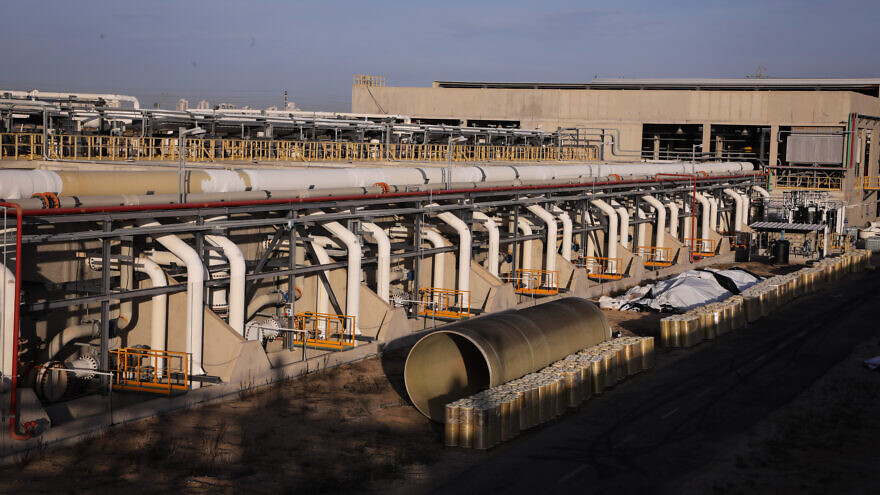Israel's Sorek Desalination Plant on Nov. 22, 2018. Photo by Isaac Harari/Flash90.
By Ayoob Kara
As the Jewish people start a new year, it is important to reflect on how Israeli desalination has become a model for many countries across the globe. Many of these countries face an acute water shortage, as Israel has in the past. Once, many Israelis feared that the Sea of Galilee, Israel’s major reservoir, was dying. Today, Israelis no longer have such fears, because no matter how hot the weather gets, Israel is pumping desalinated water into the Sea of Galilee from five different plants. No one is afraid that the place where it is said that Jesus walked on water will be no more. Today, 60-80% of Israel’s drinking water is provided by desalination plants.
According to the Israel Desalination and Treatment Society, “Israel is renowned for its outstanding success in managing its water resources. It has built some of the largest and most advanced desalination facilities worldwide. It is a global leader in water reuse and has one of the lowest water loss percentages globally. While Israel faced water scarcity two decades ago, it now assists its neighbors with their water crises and replenishes natural water resources.”
Israel supplies Jordan with 100 million cubic meters of water from the Sea of Galilee, which fulfills 20% of Jordan’s water needs. This helps strengthen the peace agreement between Israel and Jordan.
Across the Middle East and the entire world, water scarcity is a major issue. According to the World Resources Institute, “Twenty-five countries are currently exposed to extremely high water stress annually, meaning they use over 80% of their renewable water supply for irrigation, livestock, industry and domestic needs. The five most water-stressed countries are Bahrain, Cyprus, Kuwait, Lebanon, Oman and Qatar. The most water-stressed regions are the Middle East and North Africa, where 83% of the population is exposed to extremely high water stress, and South Asia, where 74% is exposed.”
The United Nations has reported that more than two billion people globally lack access to safe drinking water, with floods and droughts making an intolerable situation even worse. Some 80% of the world’s wastewater flows back into the ecosystem without being treated or reused. According to the World Resources Institute, “By 2050, an additional one billion people are expected to live with extremely high water stress, even if the world limits global temperature rises by 1.3 degrees Celsius to 2.4 degrees Celsius by 2100, an optimistic scenario.”
The World Bank has stated that, by 2050, “an additional 25 billion cubic meters of water will be needed to meet the Middle East’s needs. That is equivalent to building 65 desalination plants the size of Ras Al Khair plant in Saudi Arabia, which is currently the largest in the world.”
Israel is working around the world in order to change this horrific trend, which further compounds global climate change and the global environmental crisis.
Earlier this year, it was reported that Israel built a $5.5 billion desalination plant in Arizona and is now poised to help Azerbaijan with its water crisis. Israel has already built a desalination plant for Azerbaijan 80 kilometers south of Baku, which led to the signing of a memorandum of understanding between Azerbaijan’s Investment Company OJSC and Israel’s IDE Water Assets Ltd. The MOU will provide for the construction of a water desalination complex on the Caspian Sea. The same company has built and operated over 400 desalination plants in 40 countries, including China, India, the U.S. and Australia. The first stage of the Caspian Sea project is now being implemented in Azerbaijan, with the State Water Resource Agency of Azerbaijan and Mekorot Water Company signing a contract on technical advice.
Azerbaijanis receive most of their water from the Kura and Araz Rivers, which have faced shortages in recent years. The Azerbaijanis believe that if they use the Israeli model, they can overcome this crisis. Azerbaijan’s President Ilham Aliyev stated, “From now on, drinking water and irrigation projects will be on our agenda as the most important issues. The main goal is to eliminate the mistakes and existing shortcomings in this area in the coming years.”
“Water shortages pose a serious challenge to both lives and livelihoods as farmers and cities compete for this precious natural resource and stretch water systems,” said Ferid Belhaj, World Bank Vice President for the MENA region. “A new approach is needed to tackle this challenge, including delegating more control to local authorities on how water is allocated and managed.”
Israeli desalination plants may offer the solution to this global problem, thus strengthening the peace between Israel and various Muslim countries and paving the way for more regional cooperation.
* Ayoob Kara served as Israel’s minister of communications.
Source: JNS


































